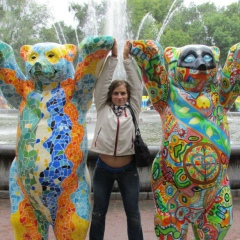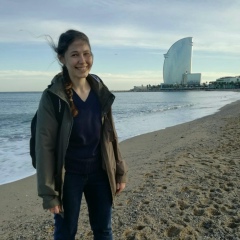“Hey how are you?” или о трудностях жизни заграницей
Когда я говорю коллегам, что мне сложно жить в Европе, многие удивляются. Особенно удивляются тогда, когда я говорю, что мечтаю вернуться обратно в Петербург. “Да ты что? Зачем? Тут же никаких перспектив нет”. И действительно, есть вещи в России, которые меня тревожат. Во-первых, более низкий уровень жизни и менее стабильная экономическая ситуация. Последняя иной раз напоминает жизнь на пороховой бочке: вот сейчас у тебя есть грант, и жить можно нормально, а если следующий не дадут, то придется затягивать пояс или искать дополнительный источник дохода. Во-вторых, чувство социальной незащищённости, по понятным причинам раскрывать этот пункт я не буду.
Казалось бы действительно, здесь можно не беспокоиться о том, чтобы хватало денег на жизнь, особенно при наличии образования и высокой квалификации. Люди в Чехии не жируют, но и не живут бедно. Даже те из них, кто работает в сфере обслуживания, живут скромно, но достойно. Полицейские своим видом не внушают никаких опасений и, судя по всему, действительно защищают граждан, а не служат средством для их устрашения. Очень многие люди на улицах улыбчивы и приветливы. Повсюду атмосфера уюта и комфорта — красивый дизайн, цветы на окнах, в городе много клумб с цветами, хорошо оборудованные детские площадки, всё сделано для того, чтобы люди чувствовали себя хорошо. И да, я могу спокойно выйти на Вацлавскую площадь в Праге с плакатом “Андрей Бабиш — коррупционер”, и мне ничего за это не будет! Более того, полицейские меня ещё и охранять будут от провокаторов. О, как! Такое вот “загнивание”.
Тут уместно было бы задать мне вопрос: “так чего же тебе тогда для счастья не хватает”? А не хватает общения, душевного и эмоционального. Причём на поверку оказалось, что этот фактор куда как более существенный, чем постоянные финансовые трудности или чувство социальной незащищённости. И дело даже не в языковом барьере, хотя он всё ещё имеет место быть. Мой английский становится всё лучше и лучше и, если не приходится общаться в компании, где много носителей языка или тех кто прожил много лет в англоговорящих странах, иной раз чувствуешь себя достаточно свободно. Могу даже шутить и понимать чужие шутки. Но при этом в общении отсутствует что-то очень важное и существенное: будто ешь и никак не можешь насытиться, или еда со вкусом бумаги. Может быть, это всего лишь иллюзия, своего рода эффект “кривого зеркала”, результат именно моего восприятия? Факт то, что в западных научных институтах или университетах работает много представителей самых разных культур, которые вынуждены как-то друг с другом взаимодействовать. И кажется, этот факт объясняет, почему большинство разговоров выходят такими скучными и поверхностными — это своего рода этикет, попытка найти хоть какие-то точки соприкосновения, когда нет общего контекста для общения и отношений.
Интересно, что даже если общение не планируется, как формальное, например в случае посиделок в баре или на вечеринке, всё равно не проходит ощущение какой-то фальши и неискренности. Да, можно сказать, что любая вежливость — это до определенной степени неискренность, но здесь это надо помножить ещё на 10 раз, а то и на 20. Приветствие, в котором в норме выражается радость встречи, превращается в дежурную скороговорку “hey how are you?”, произносимую на автомате. Посиделки в баре, где можно поговорить по душам, становятся просто формальным набухиванием и обменом довольно скучными событиями из жизни и часто такими же скучными шутками. Ощущение такое, что для учёных, работающих на западе, такое положение вещей вполне привычно и не вызывает у них столько негативных чувств (хотя кто знает). В большей степени этот формальный стиль общения характерен для наиболее “западных” людей, выходцев из США, Канады, Австралии: неестественные резко возникающие и исчезающие улыбки при встрече и вопрос “как дела?”, при полном отсутствии интереса, как эти дела обстоят. Иногда у меня получается делать этот ритуал через силу, иногда — просто забиваю, признав в себе социофоба, который никак не может найти в себе силы принять этот стиль общения. И это при полной поддержке либеральных ценностей, свободы личности и демократии. Но в повседневной жизни сталкиваешься не с ними — все плюсы жизни в Европе воспринимаются как некий фон и норма. Всё внимание концентрируется на этих постоянных трудностях в общении, непреодолимых различиях в том, как принято общаться здесь и как было принято общаться у себя дома. В итоге закономерный итог — просто уходишь в свою раковину, теряя всякое желание с кем-то взаимодействовать. Sad but true.
Когда я говорю коллегам, что мне сложно жить в Европе, многие удивляются. Особенно удивляются тогда, когда я говорю, что мечтаю вернуться обратно в Петербург. “Да ты что? Зачем? Тут же никаких перспектив нет”. И действительно, есть вещи в России, которые меня тревожат. Во-первых, более низкий уровень жизни и менее стабильная экономическая ситуация. Последняя иной раз напоминает жизнь на пороховой бочке: вот сейчас у тебя есть грант, и жить можно нормально, а если следующий не дадут, то придется затягивать пояс или искать дополнительный источник дохода. Во-вторых, чувство социальной незащищённости, по понятным причинам раскрывать этот пункт я не буду.
Казалось бы действительно, здесь можно не беспокоиться о том, чтобы хватало денег на жизнь, особенно при наличии образования и высокой квалификации. Люди в Чехии не жируют, но и не живут бедно. Даже те из них, кто работает в сфере обслуживания, живут скромно, но достойно. Полицейские своим видом не внушают никаких опасений и, судя по всему, действительно защищают граждан, а не служат средством для их устрашения. Очень многие люди на улицах улыбчивы и приветливы. Повсюду атмосфера уюта и комфорта — красивый дизайн, цветы на окнах, в городе много клумб с цветами, хорошо оборудованные детские площадки, всё сделано для того, чтобы люди чувствовали себя хорошо. И да, я могу спокойно выйти на Вацлавскую площадь в Праге с плакатом “Андрей Бабиш — коррупционер”, и мне ничего за это не будет! Более того, полицейские меня ещё и охранять будут от провокаторов. О, как! Такое вот “загнивание”.
Тут уместно было бы задать мне вопрос: “так чего же тебе тогда для счастья не хватает”? А не хватает общения, душевного и эмоционального. Причём на поверку оказалось, что этот фактор куда как более существенный, чем постоянные финансовые трудности или чувство социальной незащищённости. И дело даже не в языковом барьере, хотя он всё ещё имеет место быть. Мой английский становится всё лучше и лучше и, если не приходится общаться в компании, где много носителей языка или тех кто прожил много лет в англоговорящих странах, иной раз чувствуешь себя достаточно свободно. Могу даже шутить и понимать чужие шутки. Но при этом в общении отсутствует что-то очень важное и существенное: будто ешь и никак не можешь насытиться, или еда со вкусом бумаги. Может быть, это всего лишь иллюзия, своего рода эффект “кривого зеркала”, результат именно моего восприятия? Факт то, что в западных научных институтах или университетах работает много представителей самых разных культур, которые вынуждены как-то друг с другом взаимодействовать. И кажется, этот факт объясняет, почему большинство разговоров выходят такими скучными и поверхностными — это своего рода этикет, попытка найти хоть какие-то точки соприкосновения, когда нет общего контекста для общения и отношений.
Интересно, что даже если общение не планируется, как формальное, например в случае посиделок в баре или на вечеринке, всё равно не проходит ощущение какой-то фальши и неискренности. Да, можно сказать, что любая вежливость — это до определенной степени неискренность, но здесь это надо помножить ещё на 10 раз, а то и на 20. Приветствие, в котором в норме выражается радость встречи, превращается в дежурную скороговорку “hey how are you?”, произносимую на автомате. Посиделки в баре, где можно поговорить по душам, становятся просто формальным набухиванием и обменом довольно скучными событиями из жизни и часто такими же скучными шутками. Ощущение такое, что для учёных, работающих на западе, такое положение вещей вполне привычно и не вызывает у них столько негативных чувств (хотя кто знает). В большей степени этот формальный стиль общения характерен для наиболее “западных” людей, выходцев из США, Канады, Австралии: неестественные резко возникающие и исчезающие улыбки при встрече и вопрос “как дела?”, при полном отсутствии интереса, как эти дела обстоят. Иногда у меня получается делать этот ритуал через силу, иногда — просто забиваю, признав в себе социофоба, который никак не может найти в себе силы принять этот стиль общения. И это при полной поддержке либеральных ценностей, свободы личности и демократии. Но в повседневной жизни сталкиваешься не с ними — все плюсы жизни в Европе воспринимаются как некий фон и норма. Всё внимание концентрируется на этих постоянных трудностях в общении, непреодолимых различиях в том, как принято общаться здесь и как было принято общаться у себя дома. В итоге закономерный итог — просто уходишь в свою раковину, теряя всякое желание с кем-то взаимодействовать. Sad but true.
"Hey how are you?" or about the difficulties of living abroad
When I tell my colleagues that it is difficult for me to live in Europe, many are surprised. They are especially surprised when I say that I dream of returning back to Petersburg. “What are you? What for? There are no prospects here ”. Indeed, there are things in Russia that worry me. First, a lower standard of living and a less stable economic situation. The latter sometimes resembles life on a powder keg: now you have a grant, and you can live normally, and if the next one is not given, you will have to tighten your belt or look for an additional source of income. Secondly, the feeling of social insecurity, for obvious reasons I will not disclose this point.
It would seem that there really is no need to worry about having enough money to live on, especially if you have education and high qualifications. People in the Czech Republic do not fatten, but they do not live in poverty either. Even those who work in the service sector live modestly but with dignity. Police officers do not inspire any fear by their appearance and, apparently, really protect citizens, and do not serve as a means to intimidate them. Many people on the streets are smiling and welcoming. There is an atmosphere of coziness and comfort everywhere - beautiful design, flowers on the windows, there are many flower beds in the city, well-equipped playgrounds, everything is done to make people feel good. And yes, I can safely go to Wenceslas Square in Prague with a poster “Andrei Babis is a corrupt official”, and nothing will come of it! Moreover, the police will also protect me from provocateurs. Oh how! Such is the "decay".
Here it would be appropriate to ask me a question: "so what do you lack for happiness then?" And there is not enough communication, mental and emotional. In fact, it turned out that this factor is much more significant than constant financial difficulties or a feeling of social insecurity. And it's not even the language barrier, although it still exists. My English is getting better and better, and if you don't have to communicate in a company where there are many native speakers or those who have lived for many years in English-speaking countries, sometimes you feel quite free. I can even joke and understand other people's jokes. But at the same time, something very important and essential is missing in communication: as if you are eating and cannot get enough, or food with a taste of paper. Maybe this is just an illusion, a kind of “crooked mirror” effect, the result of my perception? The fact is that in Western scientific institutes or universities there are many representatives of various cultures who are forced to somehow interact with each other. And it seems that this fact explains why most conversations come out so boring and superficial - this is a kind of etiquette, an attempt to find at least some points of contact when there is no common context for communication and relationships.
It is interesting that even if communication is not planned as formal, for example, in the case of gatherings in a bar or at a party, the feeling of some kind of falsity and insincerity still does not pass. Yes, we can say that any politeness is, to a certain extent, insincerity, but here it must be multiplied by another 10 times, or even by 20. The greeting, which normally expresses the joy of meeting, turns into a patter on duty “hey how are you ? ”, Pronounced automatically. Gatherings in a bar, where you can talk heart to heart, become just a formal swelling and exchange of rather boring events in life and often boring jokes. The feeling is that for scientists working in the West, this state of affairs is quite familiar and does not cause so many negative feelings in them (although who knows). To a greater extent, this formal style of communication is typical for the most "Western" people, immigrants from the USA, Canada, Australia: unnatural sharply emerging and disappearing smiles when meeting and the question "how are you?", With a complete lack of interest, how are these things. Sometimes I manage to do this ritual through force, sometimes I just hammer it, admitting a social phobia in myself, who cannot find the strength to accept this communication style. And this is with the full support of liberal values, individual freedom and democracy. But in everyday life you do not come across them - all the advantages of life in Europe are perceived as a kind of background and norm. All attention is focused on these constant difficulties in communication, insurmountable differences in how it was customary to communicate here and how it was customary to communicate at home. As a result, the logical result is that you simply go to your shell, losing all desire to interact with someone. Sad but true.
When I tell my colleagues that it is difficult for me to live in Europe, many are surprised. They are especially surprised when I say that I dream of returning back to Petersburg. “What are you? What for? There are no prospects here ”. Indeed, there are things in Russia that worry me. First, a lower standard of living and a less stable economic situation. The latter sometimes resembles life on a powder keg: now you have a grant, and you can live normally, and if the next one is not given, you will have to tighten your belt or look for an additional source of income. Secondly, the feeling of social insecurity, for obvious reasons I will not disclose this point.
It would seem that there really is no need to worry about having enough money to live on, especially if you have education and high qualifications. People in the Czech Republic do not fatten, but they do not live in poverty either. Even those who work in the service sector live modestly but with dignity. Police officers do not inspire any fear by their appearance and, apparently, really protect citizens, and do not serve as a means to intimidate them. Many people on the streets are smiling and welcoming. There is an atmosphere of coziness and comfort everywhere - beautiful design, flowers on the windows, there are many flower beds in the city, well-equipped playgrounds, everything is done to make people feel good. And yes, I can safely go to Wenceslas Square in Prague with a poster “Andrei Babis is a corrupt official”, and nothing will come of it! Moreover, the police will also protect me from provocateurs. Oh how! Such is the "decay".
Here it would be appropriate to ask me a question: "so what do you lack for happiness then?" And there is not enough communication, mental and emotional. In fact, it turned out that this factor is much more significant than constant financial difficulties or a feeling of social insecurity. And it's not even the language barrier, although it still exists. My English is getting better and better, and if you don't have to communicate in a company where there are many native speakers or those who have lived for many years in English-speaking countries, sometimes you feel quite free. I can even joke and understand other people's jokes. But at the same time, something very important and essential is missing in communication: as if you are eating and cannot get enough, or food with a taste of paper. Maybe this is just an illusion, a kind of “crooked mirror” effect, the result of my perception? The fact is that in Western scientific institutes or universities there are many representatives of various cultures who are forced to somehow interact with each other. And it seems that this fact explains why most conversations come out so boring and superficial - this is a kind of etiquette, an attempt to find at least some points of contact when there is no common context for communication and relationships.
It is interesting that even if communication is not planned as formal, for example, in the case of gatherings in a bar or at a party, the feeling of some kind of falsity and insincerity still does not pass. Yes, we can say that any politeness is, to a certain extent, insincerity, but here it must be multiplied by another 10 times, or even by 20. The greeting, which normally expresses the joy of meeting, turns into a patter on duty “hey how are you ? ”, Pronounced automatically. Gatherings in a bar, where you can talk heart to heart, become just a formal swelling and exchange of rather boring events in life and often boring jokes. The feeling is that for scientists working in the West, this state of affairs is quite familiar and does not cause so many negative feelings in them (although who knows). To a greater extent, this formal style of communication is typical for the most "Western" people, immigrants from the USA, Canada, Australia: unnatural sharply emerging and disappearing smiles when meeting and the question "how are you?", With a complete lack of interest, how are these things. Sometimes I manage to do this ritual through force, sometimes I just hammer it, admitting a social phobia in myself, who cannot find the strength to accept this communication style. And this is with the full support of liberal values, individual freedom and democracy. But in everyday life you do not come across them - all the advantages of life in Europe are perceived as a kind of background and norm. All attention is focused on these constant difficulties in communication, insurmountable differences in how it was customary to communicate here and how it was customary to communicate at home. As a result, the logical result is that you simply go to your shell, losing all desire to interact with someone. Sad but true.
У записи 25 лайков,
0 репостов,
489 просмотров.
0 репостов,
489 просмотров.
Эту запись оставил(а) на своей стене Илья Удалов













































